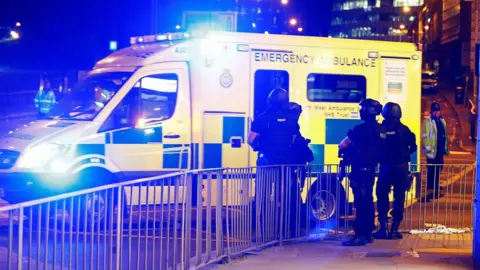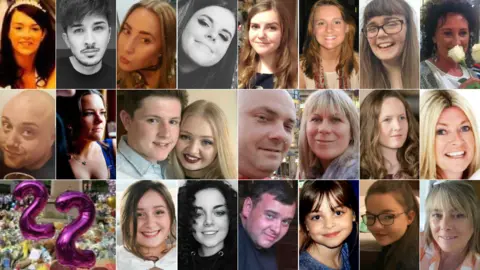Manchester Arena Inquiry: Ambulance response 'still faces delays'
 Reuters
ReutersThere remain "unacceptable delays" in getting specialist paramedics to treat casualties in some major incidents, the Manchester Arena Inquiry has heard.
The inquiry has heard only three medics went into the scene of the 2017 bombing amid concerns about further attacks.
The National Ambulance Resilience Unit's (NARU) director Keith Prior said policies had since changed, but deployments could still be delayed.
Mr Prior said that may be due to a top-level "reluctance" to send resources.
The inquiry into the 2017 bombing, which killed 22 people and injured hundreds more, has begun looking into ways of shortening the "care gap", a term used to describe the inevitable delay in trained medical professionals getting to a major incident.
Mr Prior, whose unit is responsible for ensuring ambulance services are trained and fully equipped to provide the front-line healthcare during complex incidents, told the hearing policies had improved since the attack.
However, he said there were "still unacceptable delays by multi-agency commanders" to deploy Hazardous Area Response Teams (HART) "in the early stages of incidents when casualties are at their most vulnerable".
When asked why that was, he said: "Quite possibly the reluctance of commanders to put trained and appropriate ambulance resources forwards into the incident itself."
The hearing was told ambulance commanders had received more training on deploying specialist teams, but Mr Prior agreed there was "more to be done".
'Direct patient care'
The court also heard claims there was a lack of specialist HART paramedics across England.
Mr Prior said all but one ambulance trust in the country were currently struggling to maintain the minimum number of HART staff on duty at all times.
The inquiry was told NARU believes more should be done to equip and educate the general public with training and life-saving expertise, such as how to protect an airway and stem catastrophic bleeding.
Mr Prior agreed that kind of training should start in schools.
 Family handouts
Family handoutsThe inquiry also heard from Dr Thomas Hurst, the medical director for London's Air Ambulance, who said if there had been a similar incident to the bombing in the capital then they would have deployed to help casualties.
The North West Air Ambulance was not used during the emergency response to the arena attack.
Dr Hurst said his service would undoubtedly have deployed medical teams, either by road or by air, depending on the time of day.
"Those teams would have had blood and in our case, fresh frozen plasma available to them," he added.
Dr Hurst said his service had attended all the recent terrorist attacks in the capital and he believed it had two main roles.
"One is around scene leadership or medical advice to ambulance commanders leading the scene," he said.
"The other is obviously direct patient care."
The inquiry continues.

Why not follow BBC North West on Facebook, Twitter and Instagram? You can also send story ideas to [email protected]
